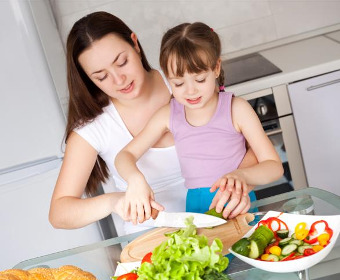
Personal Example Dedicated to Parents & Future Parents
Today you will easily find a variety of different books devoted to the upbringing of children, as well as the multitude of methodologies, each vying with the other in telling about its advantages for children and their parents. But all of the above is a bit too shallow and seems to be wrong.
One of the most crucial points is missing — educate yourself before you start bringing up your children. What for? The answer is easy and sound. Over the years the most important and almost the only people for a child are his or her mother and father — they are the whole world to a child, and it depends on them whether this world is going to be good or bad. The material aspect is vital, but it is much more important to bring up your child in accordance with high morale and spiritual orientation than placing him or her in a prestigious school or university.
As the matter of fact, the only way to bring up a child is by means of personal example. A situation when smoking parents say that smoking is terrible and they will never let their child smoke or when a father who usually spends his time lying on the sofa watching Eurosport says that he will put his kid in sports is simply ridiculous.Only personal example can demonstrate how it is possible to love reading books, to take care of garden, maintain cleanliness, have respect for elderly people, be responsible, and stand by your word.
If parents look after their health and pay attention to their personal hygiene, their child will also pay due attention to these aspects. If parents love reading books and mum or dad with a book is a common thing, their kid will also love reading. If mother and fathertake care of their parents, regularly getting in touch by phone, visiting them, their children will absorb this respect and care about their own parents.
It is worth considering that any rules are alien to children. As children do not understand rules, they do not pay attention to them. Starting at an early age a child imitates his or her parents and relatives – their behaviour, gestures, words, intonations, and facial expressions during conversation.

If parents prefer to entrust their child to care of modern technologies, the kid will imitate thebehaviour of characters from cartoons and teenage films. All fine and dandy were it not for the content of the majority of children’s TV channels that are blatantly aggressive and torporific.
It is impossible to deceive children and there is no sense in doing so. A child will continue to imitate parent’s behaviour. Therefore, much more constructive and rational way for a parent would be focusing on his or her own self. It would help to avoid questions about the source of your child’s quirks and twists.
Show by your own example what kind of person your child should be. Then, the majority of the so-called father and son relationship conflicts will simply disappear.
In conclusion it would be worth remembering Leo Tolstoy’s words:
“I have never written about children upbringing, since I consider that children upbringing means living a decent life, i.e. moving further, self-educating. Only by that people can exert influence on others and educate other people, let alone children they are linked to. The only way of children upbringing is to be honest and straightforward, not trying to disguise what happens in your soul. As to pedagogy, it is a science which teaches in what way, living indecently, one can positively influence children. It is similar to our medicine that teaches us how to remain healthy, living in contradiction with laws of nature. These sciences are cunning and vain and never reach their goal. All problems of upbringing arise from the fact that parents do not want to correct their faults. Moreover, they try to justify their faults and at the same time do not want to see these faults in their children”.
Let’s change for the better and the world will change together with us!
translated by Vlada Grishkevich
